|
|
|
Sort Order |
|
|
|
Items / Page
|
|
|
|
|
|
|
| Srl | Item |
| 1 |
ID:
187407


|
|
|
|
|
| Summary/Abstract |
On 31 October 2021, an agreement was signed between Antigua and Barbuda and Tuvalu that established a commission with the power to request an advisory opinion from the International Tribunal for the Law of the Sea (ITLOS). Since ITLOS’s advisory jurisdiction has been tested in only one case, I explain and evaluate the procedural obstacles facing this commission, as well as the potential questions it might submit to ITLOS. The analysis draws upon the jurisprudence of the International Court of Justice to indicate how ITLOS could articulate and apply its jurisdiction in an advisory case. I conclude that although there appear to be few insurmountable obstacles to securing ITLOS’s jurisdiction, care must be taken by the Commission of Small Island States on Climate Change and International Law to ensure that the questions presented to ITLOS are carefully drafted so that ITLOS has no concerns over the judicial propriety of giving an advisory opinion.
|
|
|
|
|
|
|
|
|
|
|
|
|
|
|
|
| 2 |
ID:
187408
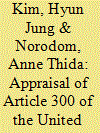

|
|
|
|
|
| Summary/Abstract |
The aim of this article is to clarify the meaning and scope of Article 300 (good faith and abuse of rights) of the United Nations Convention on the Law of the Sea (UNCLOS). Uncertainty about the meaning of Article 300 raises doubts about its raison d’être. It is insufficient to rely on the means of interpretation of treaties under Articles 31 and 32 of the Vienna Convention on the Law of Treaties and customary international law to understand Article 300 of UNCLOS. Therefore, this article analyzes relevant international cases brought before international courts and tribunals (ICTs) established under Part XV, Section 2 of UNCLOS to scrutinize the interpretation and application of Article 300. The first task of this article is to identify how ICTs have understood the structure of this provision and its character. After this general observation, this article answers the following questions: (1) Which state bears the burden of proof to invoke Article 300? (2) What conditions/steps fulfill Article 300’s invocation? (3) In which circumstances do courts uphold or reject allegations that Article 300 has been breached? This article’s findings allow for an appraisal of international judges’ interpretations of the meaning and purpose of Article 300.
|
|
|
|
|
|
|
|
|
|
|
|
|
|
|
|
| 3 |
ID:
187405
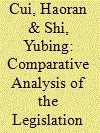

|
|
|
|
|
| Summary/Abstract |
In recent years, the maritime militia and their activities in the South China Sea have attracted mounting attention from the international community. To date, only China and Vietnam have established rules relating to maritime militia. The maritime militia systems in both China and Vietnam result from national traditional militia systems and are extended reflections of the “People’s War” ideology in the field of modern defense. They are similar in aspects such as their definitions and nature, type of activities and scope, and leadership. Also, both militias play an affiliated role in their protection of maritime rights and military systems. Nonetheless, there are distinct differences between the legislation of maritime militia in China and Vietnam, particularly in relation to the political role they play, welfare and treatment, and punishment mechanisms. Through the comparison of the legislation on maritime militia in China and Vietnam, this article aims to define the legal status of maritime militia and to propose approaches to improving China’s legislation on maritime militia.
|
|
|
|
|
|
|
|
|
|
|
|
|
|
|
|
| 4 |
ID:
187403
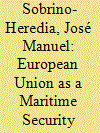

|
|
|
|
|
| Summary/Abstract |
This article analyzes piracy and banditry in the Gulf of Guinea, which in the last two decades have increased and which threaten freedom of navigation and fishing activities in the area. The situation is exacerbated by the absence of minimally effective maritime security in the region, in contrast to other areas of the world such as the Indian Ocean. Coastal states in the region are trying to cooperate to combat piracy and armed robbery in these waters. However, such initiatives are not a sufficient response to the scale of violence at sea. Therefore, actors outside the region, such as the European Union, have initiated action aimed at supporting these efforts and contributing to improving maritime security in the Gulf of Guinea. These initiatives have been channeled through a strategy that includes the coordinated maritime presence of naval forces in this maritime area.
|
|
|
|
|
|
|
|
|
|
|
|
|
|
|
|
| 5 |
ID:
187409
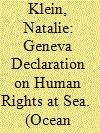

|
|
|
|
|
| Summary/Abstract |
The Geneva Declaration on Human Rights at Sea was officially launched on 1 March 2022. The document was produced by the nongovernmental organization Human Rights at Sea, and responds to an undoubted need to prevent human rights violations at sea and to provide redress to victims of such abuses. Connecting the international human rights regime with the law of the sea has been one of many challenges to respond to this issue. This article explores the content of the Geneva Declaration and its alignment with existing law of the sea. Beyond the jurisdictional complexities presented, it is important to consider how this informal instrument holds relevance for international lawmaking. While there are obstacles, the Geneva Declaration creates a needed opportunity to bring attention to and clarity around the legal protections of human rights at sea.
|
|
|
|
|
|
|
|
|
|
|
|
|
|
|
|
| 6 |
ID:
187404


|
|
|
|
|
| Summary/Abstract |
The Strait of Hormuz has great significance for the world economy as an oil chokepoint. Yet in recent years, international navigation through the Strait of Hormuz has been repeatedly hampered and subject to discriminatory navigational restrictions and attacks. Such measures have been mostly aimed at oil tankers. This article examines the maritime incidents that occurred in the Strait of Hormuz in 2019: mine attacks against oil tankers and the arrest of an oil tanker by the Iranian armed forces. This study approaches these incidents from the perspectives of the law of the sea and from jus ad bellum.
|
|
|
|
|
|
|
|
|
|
|
|
|
|
|
|
| 7 |
ID:
187410
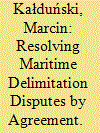

|
|
|
|
|
| Summary/Abstract |
The extension of coastal states’ jurisdiction over seas in the twentieth century significantly increased the maritime area of overlapping entitlements. The Baltic Sea is a textbook example of such competing claims. In principle, the two main avenues for a coastal state to resolve its dispute are to either conclude a delimitation agreement or lodge the case with an international court or tribunal. This article analyzes the Delimitation Agreement between Denmark and Poland concerning the Baltic Sea south of the island of Bornholm. The states were divided as to how to apportion the maritime zone of 3,500 km2, where the economic zones of Denmark and Poland had not been delimited for several dozen years. The agreed single maritime boundary split the disputed area into unequal parts. The settlement of the maritime dispute coincided temporally with Poland and Denmark’s plans to build a natural gas pipeline at the bottom of the Baltic Sea, which probably prompted the two states to put an end to their maritime boundary dispute. The law of the sea provides that the delimitation of maritime zones between states with opposite or adjacent coasts is effected by agreement on the basis of international law in order to achieve an equitable solution. The purpose of this article is to show that (energy) security issues may prompt a resolution of a maritime boundary dispute, and to analyze the Polish–Danish Agreement in the light of the principles governing the maritime delimitation.
|
|
|
|
|
|
|
|
|
|
|
|
|
|
|
|
| 8 |
ID:
187402
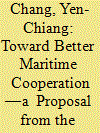

|
|
|
|
|
| Summary/Abstract |
The development of sea power theory has undergone a transformation in the contemporary context. The 21st Century Maritime Silk Road Initiative, as proposed by China, is promoted as an effort to establish a cooperative development model. This approach would also seem to be consistent with the essence of modern sea power and the 21st Century Maritime Silk Road Initiative. This article argues that in order to establish a viable legal cooperative framework, “hard power” cooperation and “soft power” cooperation models should be introduced, on the basis of current international treaties and customary law, and with reference to international experience.
|
|
|
|
|
|
|
|
|
|
|
|
|
|
|
|
| 9 |
ID:
187406
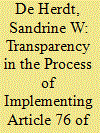

|
|
|
|
|
| Summary/Abstract |
The lack of transparency in the work of the Commission on the Limits of the Continental Shelf constitutes a major issue for both submitting and third states. In this respect, a careful reader of the reports of UNCLOS Meeting of the States Parties would not fail to discern the constant calls for transparency in the work of this body. While much has already been said on the transparency/confidentiality issues in the work of the Commission, new issues have emerged, such as the question of transparency in the internal relationship between the Commission and its subcommission. Prompted by this observation, this article discusses the process of implementing Article 76 of UNCLOS through the prism of transparency, opacity, and confidentiality, with a particular focus on the instances of disagreements between the subcommission and the Commission in plenary.
|
|
|
|
|
|
|
|
|
|
|
|
|
|
|
|
|
|
|
|
|